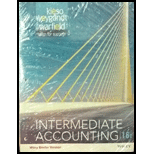
Unrealized holding gains and losses: An unrealized gain is a profit recorded on paper results from the investment. It occurs when shares prices increase after investor purchases it, but an individual has to sell it, till the time it is not sold the amount of increase in share price is recorded as an unrealized gain.
An unrealized loss is a loss recorded on paper results from the investment. It occurs when shares prices decrease after investor purchases it, but an individual has to sell it, till the time it is not sold the amount of decrease in share price is recorded as an unrealized loss.
Fair value: Fair value is a selling price which is agreed by the buyer and seller. It is also the estimate of the potential market price of good, service or asset.
(a) To determine: To determine and prepare the adjusting entry where Fair Value Adjustment account Balance is 0.
Given information: All the information related to B Company is provided in the question document.
(b) To discuss: To discuss the reporting of amount of the financial statement that is affected by the
Given information: All the information related to B Company is provided in the question document.
Want to see the full answer?
Check out a sample textbook solution
Chapter 17 Solutions
Intermediate Accounting 16E Binder Ready Version With Wiley Plus Blackboard
- Hello tutor solve this question accountingarrow_forwardI need help with this problem and accounting questionarrow_forwardJackson's Automotive has total assets of $300,000, a debt-equity ratio of 0.50, and net income of $24,000. What is the return on equity? A) 8.70 percent B) 9.50 percent C) 12.80 percent D) 11.30 percent E) 10.20 percentarrow_forward
- Which of the following is the most appropriate way to display liabilities on the balance sheet? a. alphabetically by payee b. relative likelihood of payment c. nearness to maturity d. All of these answer choices are correct.arrow_forwardCan you help me with accounting questionsarrow_forwardFor which of the following would year-end accrual of a current liability be optional? a. Current portion of a long-term lease obligation that comes due next year b. A declared property dividend c. Sick pay benefits that accumulate but do not vest d. Short-term debt that is being refinanced on a long-term basisarrow_forward
- Quick answer of this accounting questionsarrow_forwardSwifty Supply Co. has the following transactions related to notes receivable during the last 2 months of 2027. The company does not make entries to accrue interest except at December 31. Nov. 1 Loaned $30,000 cash to Manny Lopez on a 12 month, 10% note. Dec. 11 Sold goods to Ralph Kremer, Inc., receiving a $85,500, 90-day, 8% note. 16 Received a $87,840, 180 day. 10% note to settle an open account from Joe Fernetti. 31 Accrued interest revenue on all notes receivable. (a) Journalize the transactions for Swifty Supply Co. (Ignore entries for cost of goods sold.) (Credit account titles are automatically indented when amount is entered. Do not indent manually. Use 360 days for cal in the order presented in the problem. List all debit entries before credit entries.) Date Account Titles and Explanation Debit Creditarrow_forwardHi expert please give me answer general accounting questionarrow_forward

 AccountingAccountingISBN:9781337272094Author:WARREN, Carl S., Reeve, James M., Duchac, Jonathan E.Publisher:Cengage Learning,
AccountingAccountingISBN:9781337272094Author:WARREN, Carl S., Reeve, James M., Duchac, Jonathan E.Publisher:Cengage Learning, Accounting Information SystemsAccountingISBN:9781337619202Author:Hall, James A.Publisher:Cengage Learning,
Accounting Information SystemsAccountingISBN:9781337619202Author:Hall, James A.Publisher:Cengage Learning, Horngren's Cost Accounting: A Managerial Emphasis...AccountingISBN:9780134475585Author:Srikant M. Datar, Madhav V. RajanPublisher:PEARSON
Horngren's Cost Accounting: A Managerial Emphasis...AccountingISBN:9780134475585Author:Srikant M. Datar, Madhav V. RajanPublisher:PEARSON Intermediate AccountingAccountingISBN:9781259722660Author:J. David Spiceland, Mark W. Nelson, Wayne M ThomasPublisher:McGraw-Hill Education
Intermediate AccountingAccountingISBN:9781259722660Author:J. David Spiceland, Mark W. Nelson, Wayne M ThomasPublisher:McGraw-Hill Education Financial and Managerial AccountingAccountingISBN:9781259726705Author:John J Wild, Ken W. Shaw, Barbara Chiappetta Fundamental Accounting PrinciplesPublisher:McGraw-Hill Education
Financial and Managerial AccountingAccountingISBN:9781259726705Author:John J Wild, Ken W. Shaw, Barbara Chiappetta Fundamental Accounting PrinciplesPublisher:McGraw-Hill Education





